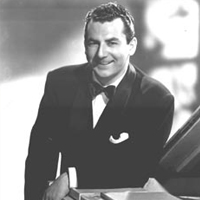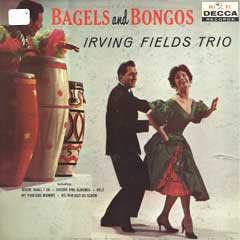Trained in the prime years of Tin Pan Alley and immersed in the classic American popular music of the pre-World War II era, IRVING FIELDS is simply one of the last of a truly special generation who continues to perform to this day.
Capturing the career of Irving Fields would require an immense effort. His “lounge” credentials place him at the top of pianists who played NYC’s finest hotels and society rooms. His piano trio recordings celebrate this aspect of his work. Then there are his legendary solo cocktail piano skills that allow him to play “any request” from the audience and seamlessly string together snippets of tunes from disparate eras and syles to form masterfully flawless medleys. One cannot forget his seminal compositional and arranging work that joined Latin, jazz and popular music, resulting in such international hits as “Miami Beach Rhumba” and “Managua Nicaragua.” In addition, his series of world fusion records that artfully combined Latin rhythms with Jewish music (Bagels and Bongos), Italian music (Pizza and Bongos), French music (Champagne and Bongos) and Hawaiian music (Bikinis and Bongos) remain immortal ’50s period pieces and influential precursors to today’s world fusion.
Irving Fields grew up on the Lower East Side of New York City. His first piano lessons came at 8 years old, and he was the only one of six children to complain about practicing. However, at age 15, Irving won the Fred Allen Radio Amateur Hour and was given a week engagement at the Roxy Theater. Entrance into the prestigious Eastman School of Music followed as did classical piano engagements and cruise ship appearances. His biggest signature style developed when, at eighteen and earning $10 a week, a cruise ship job brought him to Havana and San Juan. Irving was hooked on Latin music. He brought it back to New York to form a trio and later an octet, and found work at the Savoy Lounge in New York’s Plaza Hotel. New York was discovering Latin rhythm, thanks to great bands like Xavier Cugat’s, and this young man from the Lower East Side.
In 1941, Irving was drafted into the army and wound up in Fort Dix, New Jersey, to await his fate. As thousands of inductees were standing around on a steamy-hot summer day waiting for the general to show up, a captain yells, “Can anyone here entertain?” Sure enough, Irving obliged. After the general showed up, the captain told Irving, “I’m putting you in Special Services” — entertaining the troops. Irving was able to form an ethnically diverse Latin group, and spent his army tenure having the good fortune of entertaining.
While on leave in Florida, Irving met an agent who booked bands for several Florida hotels, who made Iriving promise to contact him upon his discharge. Sure enough, Irving did so. At Miami’s Versailles Hotel, with Latin music the rage, he formed another eight-piece orchestra and began a career in hotels that continues to this day. During his stay in Miami, Florida, Irving wrote one of his most popular tunes, “Miami Beach Rumba.”
Back in New York City in the late ’40s and into the ’50s, Irving worked at the Crest Room on East 56th Street, and continued in the Latin style with a trio. He met Cugat there, who at first spoke to Irving in Spanish. Irving said, “Mr. Cugat, I’m not Spanish, I’m American. I know Spanish songs but I don’t know the language.” Cugat was shocked, but offered Irving a job with his band. Irving, however, decided to decline and stick to his trio.
Irving’s agent, Leonard Green, brought in an RCA Victor representative to listen to Fields’ band and he was soon signed to his first recording contract, billed as the Irving Campos Trio (campos means fields in Spanish). Recording a mixture of popular, Latin and classical music, Irving took “Poet and Peasant Overture” and played it as a rumba — it became “Poet and Peasant Rumberture,” classical and jazz. He also recorded “Miami Beach Rumba,” which sold over 2 million copies. Within several months, Irving was making the Billboard, Variety and Cashbox top ten most popular trio lists. From there, everything opened up. Irving appeared on the Milton Berle, Kate Smith and Jackie Gleason shows, at the Roxy Theatre, London Palladium and the Eddie Cantor show in Las Vegas, and at Carnegie Hall (New York) and Symphony Hall (Boston, MA).
Fields left RCA after a dispute involving the type of music he should record, and he began to produce his own music. While working in Boston, Irving heard a local Jewish radio program with beautiful melodies. He decided to try them with a Latin tempo. Fields brought his bongo player, bass player and drummer into a Boston recording studio, took the demo to Decca Records, and was offered a lucrative contract.
In a Boston deli, he was asked what he planned to title the album of Jewish favorites. It struck him in the middle of a bite of his bagels-and-lox sandwich: Bagels and Bongos. Decca prompted Fields to expand on the successful formula and Pizzas and Bongos, Champagne and Bongos and Bikinis and Bongos were born. He had also written and recorded “Managua, Nicaragua,” “Chantez, Chantez,” “Take Her To Jamaica,” and an album titled Children’s Favorites, which included “Who Put The Banana In The Piano?” and “The Purpose of the Porpoise.”
In the days when many New York hotels did live radio broadcasts, Fields found a home at the Park Sheraton, and stayed for 16 years. Tired of travelling and touring to promote his records and with dance music fading, he became a solo pianist. He has been and remains a fixture in Manhattan hotels since, including performing at the Plaza Hotel for 8 years, the Sheraton for 3 years, the Intercontenental Hotel for 1-1/2 years, the Park Lane Hotel for 2 years, and 4 summers at the Hudson Valley Resort. Still performing to this day, Irving can be found at local New York City cabarets, restaurants and rooms, where he continues to entertain and delight music fans of all ages.


